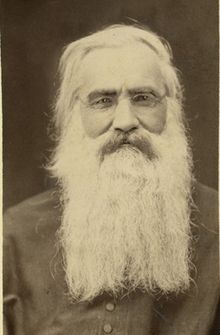Edward Sorin
|
The Very Reverend Edward Sorin C.S.C. |
|
|---|---|
 |
|
| 1st President of the University of Notre Dame |
|
|
In office 1844–1865 |
|
| Preceded by | Inaugural holder |
| Succeeded by | Patrick Dillon |
| 1st American Provincial Superior of the Congregation of Holy Cross |
|
|
In office 1865–1868 |
|
| 3rd Superior General of the Congregation of Holy Cross |
|
|
In office 1868–1893 |
|
| Preceded by | Pierre Dufal |
| Succeeded by | Gilbert Français, C.S.C |
| Personal details | |
| Born |
Edouard Sorin February 6, 1814 Ahuillé, Mayenne, France |
| Died | October 31, 1893 (aged 79) South Bend, Indiana, United States |
| Resting place | Holy Cross Cemetery, South Bend, Indiana |
| Profession | Priest |
| Religion | Roman Catholic |
Edward Frederick Sorin, C.S.C. (February 6, 1814 – October 31, 1893), a priest of the Congregation of Holy Cross, was the founder of the University of Notre Dame in Indiana and of St. Edward's University in Austin, Texas.
Edouard Frédéric Sorin was born February 6, 1814, at Ahuillé, near Laval, France. His early education was directed by his mother, known for her intelligence and virtue. After completing his classical studies, his vocation for the priesthood being marked, M. Sorin entered the diocesan seminary, where he was distinguished for superior ability and exemplary life. Among his fellow students was the future Cardinal Langénieux.
At the time of Sorin's ordination, glowing reports of missionary enterprise in foreign lands had fired afresh the hearts of French clergy, and inspired numerous vocations, not a few of which were those of future martyrs, particularly in China and Japan. It was to the first of these countries that the Abbé Sorin felt attracted; and to the end of his long life accounts of the trials and triumphs of Chinese missionaries had for him a singular fascination. He was influenced by circumstances to enroll himself in the Congregation of Holy Cross, a community of priests, brothers, and sisters lately founded at Le Mans by the Blessed Basil Moreau. The need of missionaries in the United States, so earnestly represented in letters from bishops in this country and in addresses by others who had occasion to visit Europe, was not to be disregarded by the heads of religious orders; and although France had not as yet recovered from the effects of the Revolution, she generously contributed men and means for the support and spread of American missions. Sorin, but recently ordained, was selected by his superiors to establish the Congregation of Holy Cross in what was then considered a remote district of the United States.
Accompanied by six brothers, he arrived in New York in the autumn of 1841, and immediately set out for Indiana, which was destined to be the field, the center rather, of his apostolate for upwards of half a century. After a short stay at St. Peter's in the Diocese of Vincennes, he proceeded northward with five of his confreres. At the age of 28, in the beginning of an exceptionally rigorous winter, in poverty and privation, on November 26, 1842, Sorin began the foundation of Notre Dame. Fr. Sorin and his Holy Cross brothers took possession of 524 snow-covered acres that the Bishop of Vincennes had given them in the Indiana mission fields and named his fledging school in honor of Our Lady, in his native tongue of French, “L’Université de Notre Dame du Lac” (The University of Our Lady of the Lake). Sorin, following Moreau’s example, sent out priests and brothers to found other schools and parishes throughout the United States and Canada. On Jan. 15, 1844, the Indiana legislature officially chartered the University of Notre Dame. It would be fair to say that as of 1844 and for many years thereafter, the designation of Notre Dame as a "University," as that term is understood today, was more aspirational than descriptive. Sorin himself, being the product of the French seminary system and by temperament more of an administrator than an academic or intellectual, was content to run Notre Dame on the model of a French boarding school, which included elementary (the "minims"), preparatory, and collegiate programs, as well as a manual training school. Over the years, however, he accepted the recommendations of others, including Fr. John A. Zahm, C.S.C., to strengthen Notre Dame's academic curriculum.
...
Wikipedia
